Unit 5 What's the highest mountain in the world?语法辨析课件 (共18张PPT)
文档属性
| 名称 | Unit 5 What's the highest mountain in the world?语法辨析课件 (共18张PPT) |
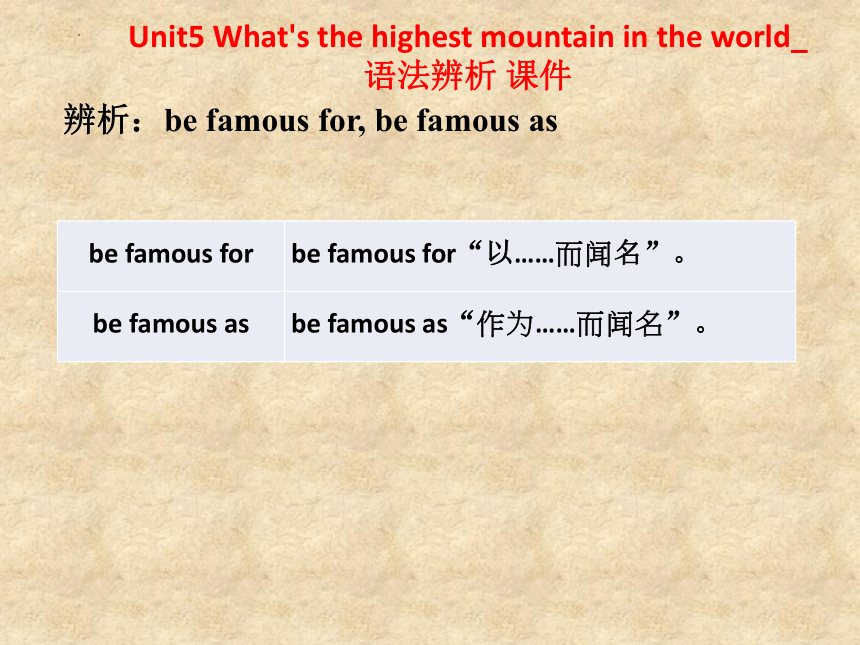
|
|
| 格式 | zip | ||
| 文件大小 | 112.8KB | ||
| 资源类型 | 教案 | ||
| 版本资源 | 鲁教版 | ||
| 科目 | 英语 | ||
| 更新时间 | 2022-08-26 18:53:53 | ||
图片预览

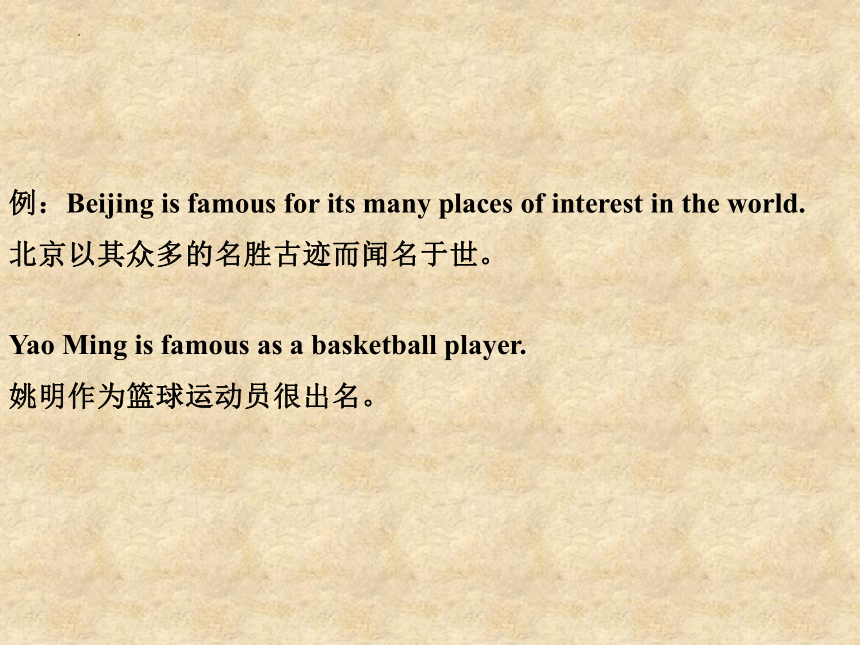
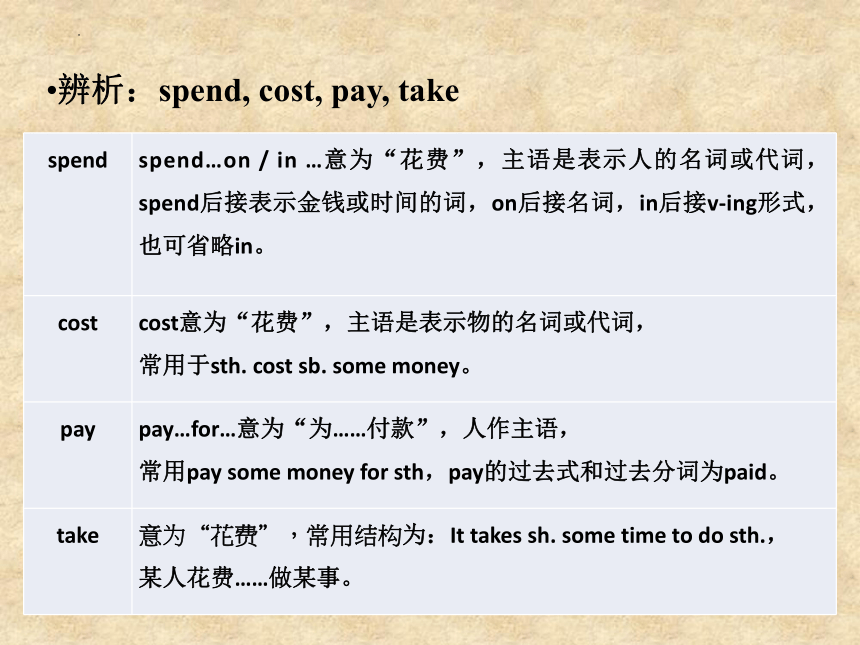
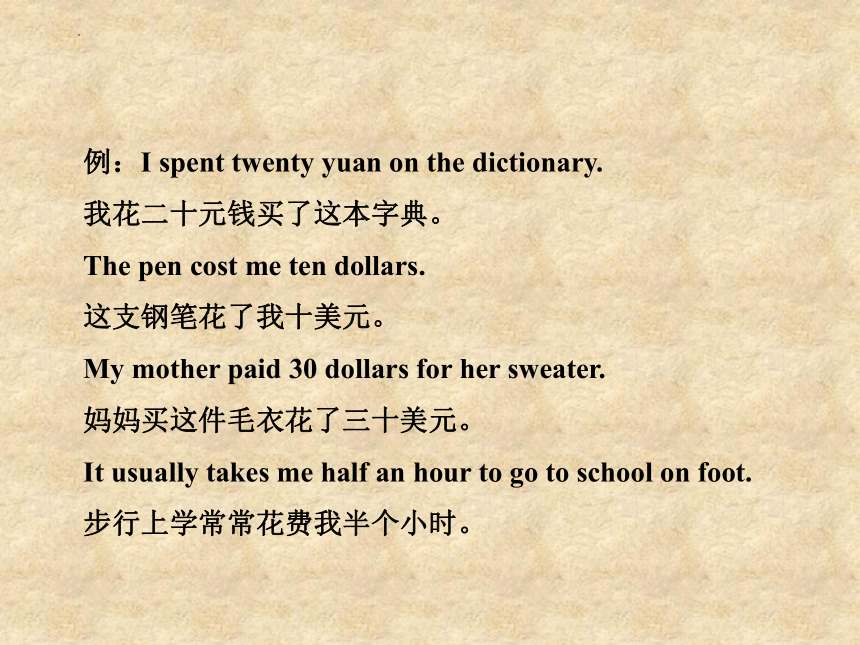
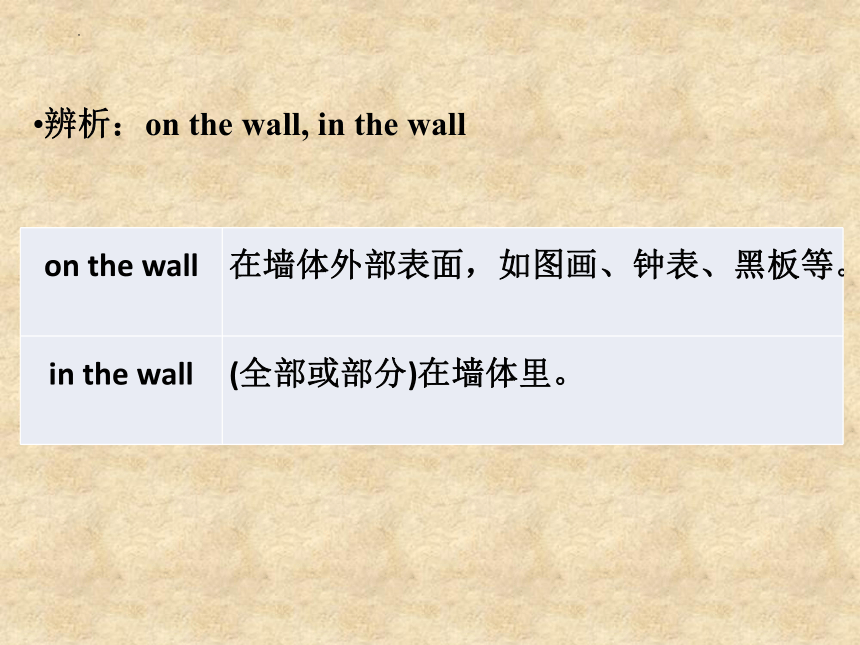
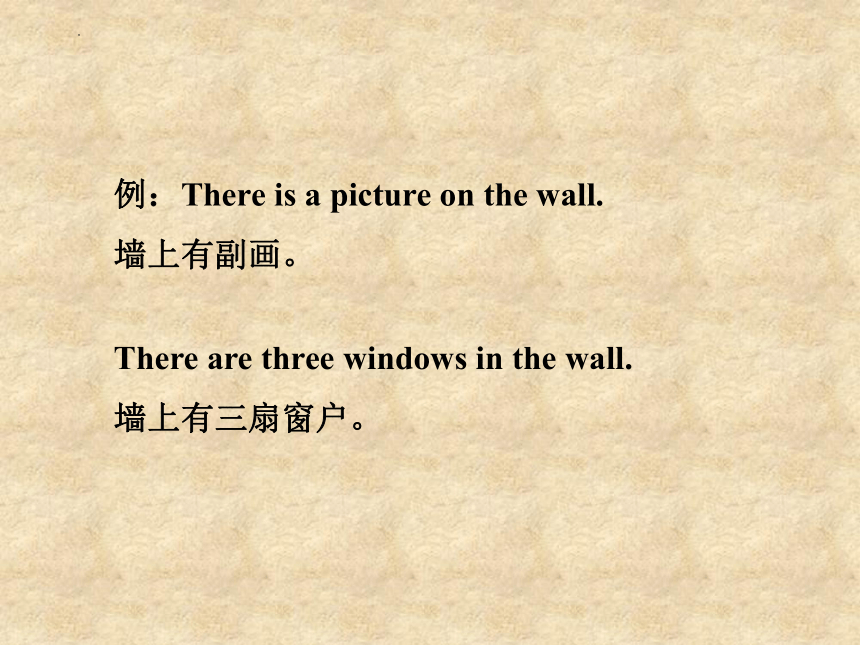
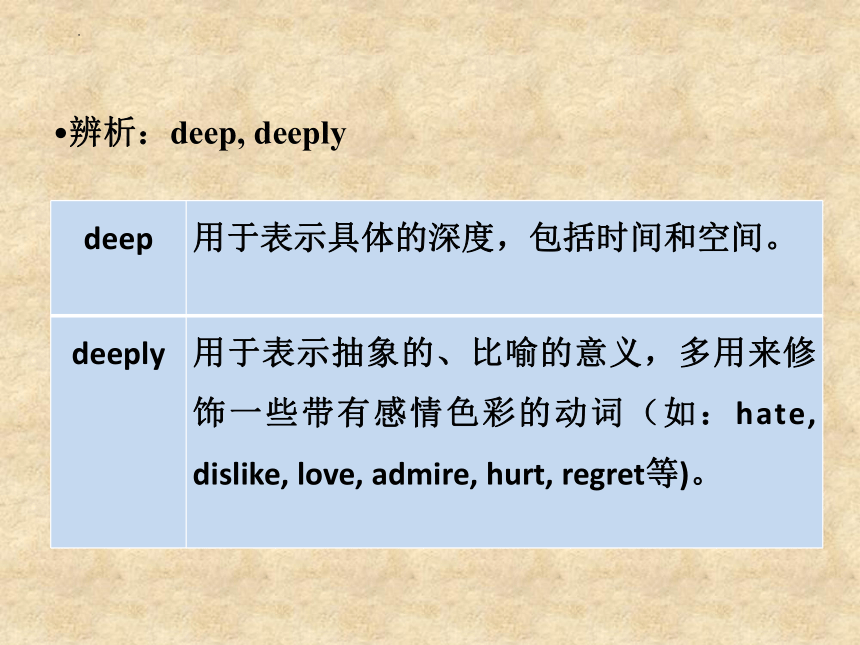
文档简介
(共18张PPT)
辨析:be famous for, be famous as
be famous for be famous for“以……而闻名”。
be famous as be famous as“作为……而闻名”。
Unit5 What's the highest mountain in the world_语法辨析 课件
例:Beijing is famous for its many places of interest in the world.
北京以其众多的名胜古迹而闻名于世。
Yao Ming is famous as a basketball player.
姚明作为篮球运动员很出名。
spend spend…on / in …意为“花费”,主语是表示人的名词或代词,spend后接表示金钱或时间的词,on后接名词,in后接v-ing形式,也可省略in。
cost cost意为“花费”,主语是表示物的名词或代词,
常用于sth. cost sb. some money。
pay pay…for…意为“为……付款”,人作主语,
常用pay some money for sth,pay的过去式和过去分词为paid。
take 意为“花费”,常用结构为:It takes sh. some time to do sth.,
某人花费……做某事。
辨析:spend, cost, pay, take
例:I spent twenty yuan on the dictionary.
我花二十元钱买了这本字典。
The pen cost me ten dollars.
这支钢笔花了我十美元。
My mother paid 30 dollars for her sweater.
妈妈买这件毛衣花了三十美元。
It usually takes me half an hour to go to school on foot.
步行上学常常花费我半个小时。
on the wall 在墙体外部表面,如图画、钟表、黑板等。
in the wall (全部或部分)在墙体里。
辨析:on the wall, in the wall
例:There is a picture on the wall.
墙上有副画。
There are three windows in the wall.
墙上有三扇窗户。
deep 用于表示具体的深度,包括时间和空间。
deeply 用于表示抽象的、比喻的意义,多用来修饰一些带有感彩的动词(如:hate, dislike, love, admire, hurt, regret等)。
辨析:deep, deeply
如:She went on studying deep into the night.
她继续学习到深夜。
We deeply regret your misfortune.
我们对你的不幸深表遗憾。
achieve 指实现成绩、目标,主语是人。
come true 实现,多指梦想、蓝图、计划,主语是物。
辨析:achieve, come true
如:He hopes to achieve all his aims soon.
他希望尽快达到所有目标。
At last, his dream came true.
最后,他实现了他的梦想。
excite 使兴奋,使激动,是动词。
exciting 令人兴奋的,用于形容感情方面影响他人的人或物,主语一般是物,在句中作表语或定语。
excited 兴奋的,为形容词,多指人受到物的影响,表示被动含义,主语一般是人,在句中作表语。常用结构:be excited about…对……感到兴奋。
excitement 激动,兴奋,是名词。常用结构:to one’s excitement使某人兴奋的是。
辨析:excite, exciting, excited, excitement
如:The news excited everybody.
这个消息使每个人都很兴奋。
The news is so exciting that we can’t go to sleep.
这个消息让我们兴奋得无法入睡。
We are very excited to hear of your success.
听说你们的成功,我们非常兴奋。
To our excitement, our team won.
让我们兴奋的是,我们队贏了。
huge 指实物时,强调尺寸或容积的庞大,指抽象事物时有“重大的,极大的”意思。
great 常用来修饰抽象名词,含有一定的感彩,表示“巨大的,伟大的,突出的”意思。
辨析:huge, great
如:We’ll have to use leverage to move this huge rock.
我们将不得不借助杠杆之力来移动这块石。
She has made great progress.
她取得了巨大的进步。
die from 意为“死于”,强调死因是由环境造成的(主要指事故等方面的外部原因)。
die of 意为“因……而死”,其宾语表示死亡的原因,—般用于疲劳、寒冷、饥渴、年老、失望、悲伤等感情原因而造成的死亡。
辨析:die from, die of
He died from an accident/a wound/disease/overwork/polluted air.
他死于事故/受伤/疾病/过度劳累/污染的空气。
He died of fear/disappointment/disease/old age/hunger/cold/sorrow.
他死于恐惧/失望/疾病/年老/饥饿/寒冷/忧伤。
awake 形容词,作表语,意思是“醒着的”。
wake 动词“醒;叫醒”, 常与副词up连用。
辨析:awake, wake
如:Is he awake or asleep
他醒着还是睡着?
What time do you usually wake (up)
你通常在什么时候醒来?
辨析:be famous for, be famous as
be famous for be famous for“以……而闻名”。
be famous as be famous as“作为……而闻名”。
Unit5 What's the highest mountain in the world_语法辨析 课件
例:Beijing is famous for its many places of interest in the world.
北京以其众多的名胜古迹而闻名于世。
Yao Ming is famous as a basketball player.
姚明作为篮球运动员很出名。
spend spend…on / in …意为“花费”,主语是表示人的名词或代词,spend后接表示金钱或时间的词,on后接名词,in后接v-ing形式,也可省略in。
cost cost意为“花费”,主语是表示物的名词或代词,
常用于sth. cost sb. some money。
pay pay…for…意为“为……付款”,人作主语,
常用pay some money for sth,pay的过去式和过去分词为paid。
take 意为“花费”,常用结构为:It takes sh. some time to do sth.,
某人花费……做某事。
辨析:spend, cost, pay, take
例:I spent twenty yuan on the dictionary.
我花二十元钱买了这本字典。
The pen cost me ten dollars.
这支钢笔花了我十美元。
My mother paid 30 dollars for her sweater.
妈妈买这件毛衣花了三十美元。
It usually takes me half an hour to go to school on foot.
步行上学常常花费我半个小时。
on the wall 在墙体外部表面,如图画、钟表、黑板等。
in the wall (全部或部分)在墙体里。
辨析:on the wall, in the wall
例:There is a picture on the wall.
墙上有副画。
There are three windows in the wall.
墙上有三扇窗户。
deep 用于表示具体的深度,包括时间和空间。
deeply 用于表示抽象的、比喻的意义,多用来修饰一些带有感彩的动词(如:hate, dislike, love, admire, hurt, regret等)。
辨析:deep, deeply
如:She went on studying deep into the night.
她继续学习到深夜。
We deeply regret your misfortune.
我们对你的不幸深表遗憾。
achieve 指实现成绩、目标,主语是人。
come true 实现,多指梦想、蓝图、计划,主语是物。
辨析:achieve, come true
如:He hopes to achieve all his aims soon.
他希望尽快达到所有目标。
At last, his dream came true.
最后,他实现了他的梦想。
excite 使兴奋,使激动,是动词。
exciting 令人兴奋的,用于形容感情方面影响他人的人或物,主语一般是物,在句中作表语或定语。
excited 兴奋的,为形容词,多指人受到物的影响,表示被动含义,主语一般是人,在句中作表语。常用结构:be excited about…对……感到兴奋。
excitement 激动,兴奋,是名词。常用结构:to one’s excitement使某人兴奋的是。
辨析:excite, exciting, excited, excitement
如:The news excited everybody.
这个消息使每个人都很兴奋。
The news is so exciting that we can’t go to sleep.
这个消息让我们兴奋得无法入睡。
We are very excited to hear of your success.
听说你们的成功,我们非常兴奋。
To our excitement, our team won.
让我们兴奋的是,我们队贏了。
huge 指实物时,强调尺寸或容积的庞大,指抽象事物时有“重大的,极大的”意思。
great 常用来修饰抽象名词,含有一定的感彩,表示“巨大的,伟大的,突出的”意思。
辨析:huge, great
如:We’ll have to use leverage to move this huge rock.
我们将不得不借助杠杆之力来移动这块石。
She has made great progress.
她取得了巨大的进步。
die from 意为“死于”,强调死因是由环境造成的(主要指事故等方面的外部原因)。
die of 意为“因……而死”,其宾语表示死亡的原因,—般用于疲劳、寒冷、饥渴、年老、失望、悲伤等感情原因而造成的死亡。
辨析:die from, die of
He died from an accident/a wound/disease/overwork/polluted air.
他死于事故/受伤/疾病/过度劳累/污染的空气。
He died of fear/disappointment/disease/old age/hunger/cold/sorrow.
他死于恐惧/失望/疾病/年老/饥饿/寒冷/忧伤。
awake 形容词,作表语,意思是“醒着的”。
wake 动词“醒;叫醒”, 常与副词up连用。
辨析:awake, wake
如:Is he awake or asleep
他醒着还是睡着?
What time do you usually wake (up)
你通常在什么时候醒来?
同课章节目录
- Unit 1 Could you please clean your room?
- Section A
- Section B
- Unit 2 Why don't you talk to your parents?
- Section A
- Section B
- Unit 3 What were you doing when the rainstorm came
- Section A
- Section B
- Unit 4 An old man tried to move the mountains.
- Section A
- Section B
- Unit 5 What's the highest mountain in the world?
- Section A
- Section B
- Unit 6 Have you read Treasure Island yet?
- Section A
- Section B
- Unit 7 Have you ever been to a museum?
- Section A
- Section B
- Unit 8 I've had this bike for three years.
- Section A
- Section B
